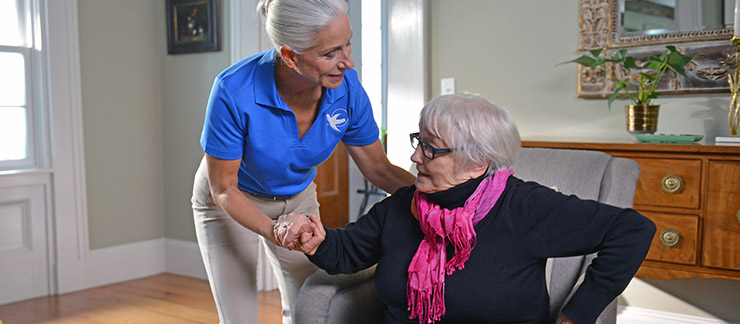
Comparing Non-Medical vs. Medical Home Care Services
Choice matters when searching for the best type of in-home care for an aging loved one. However, there are many options, and it can sometimes feel confusing and stressful.
The first decision is to determine the level of home care your senior needs: Non-medical or medical.
Let’s walk through the differences and similarities of non-medical and medical home care so you can make an educated and informed decision.
Non-Medical Caregiver Services
Non-medical care can last as long as you desire and has the most choice and flexibility to build a trusting, comfortable relationship with a caregiver team. Visiting Angels offers non-medical care services, which can include:
- Companionship
- Errands, shopping, and transportation
- Help with mobility and transfers
- Help with self-care, such as dressing, bathing, and toileting
- Light housekeeping
- Meal preparation
- Medication reminders
With non-medical care from Visiting Angels, you can choose how long you wish to have the services. You can keep your relationship with us for days or years if you choose. You also have the flexibility to scale the level of care up and down as needs change.
Visiting Angels care options include:
- Companion care
Services typically include socialization activities, such as conversation and personal interaction, in and outside the home. - Personal care
Companionship paired with self-care and supportive services for seniors with chronic conditions. - Respite care
Short-term relief of your home care duties as the primary caregiver. - Specialized home care
Specialized services for elders with memory conditions or recent hospitalization. These services can be combined with traditional home care to develop a tailored plan. - 24-hour care
Temporary or long-term care for your senior around the clock. This could be for a transition to home after hospitalization or an alternative to assisted living or nursing home.
Visiting Angels’ support can be used as a stand-alone service, or you can pair it with medical care services.
Related reading: Home Care Questions & Answers
Medical Home Health Aide Services
Medical care aides generally provide temporary, structured care with defined health and functionality goals for your senior and timelines to complete those goals.
You may have options about the days or hours of in-home visits. The services are prescribed by your senior’s doctor and are usually short-term.
This is where families often get confused. Services covered by insurance or Medicare are usually very specific. An aide may provide a bath, ambulation assistance, and transfer support similar to a non-medical caregiver. The difference is that medical aide services are generally limited to one-hour timeframes.
Medical aide services are permitted only when there is a need for a skilled service to support it, such as nursing, physical therapy, or occupational therapy. Once the skilled care goals are accomplished, all aide services are discontinued, depending on what the primary care provider has ordered.
Important Note: Generally, the goal of support from a medical aide is to achieve a specific health goal within a timeframe set by your senior’s health care provider. This support can stand alone or work in harmony with non-medical care services.
Related reading: Home Care Nurse or In-Home Personal Caregiver?
Each type of home care serves a purpose and can be combined to give your elderly loved one the best support. Securing trustworthy home care is no easy task, and Visiting Angels is here to support your family. We provide a free, no-obligation consultation to help you make the best decision.
Visiting Angels Is Here to Help
Contact your local home care office to learn how Visiting Angels can support your senior. Schedule a free home care consultation today.
